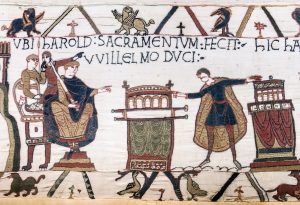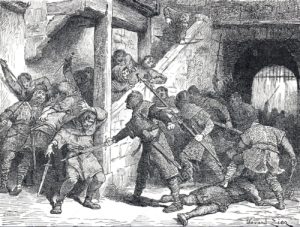
That is one of the most debated questions in Pre-Conquest history, with no answer in sight. Was William’s claim to the English throne the result of wishful thinking? Was he promised the crown directly by King Edward, or was the offer presented by a third party? Did Harold Godwineson even know about William’s designs on the throne when he made his fateful visit to Normandy in 1064?
Let’s start with William’s pedigree. Richard I, Duke of Normandy was Queen Emma’s father; this made him the grandfather of Edward the Confessor. Richard I was also the great-grandfather of Duke William. So there was a distant kinship between Edward and William, though one generation apart.
When Edward the Confessor left Normandy in 1041, William was only 13 years old and Edward was 38. With that age gap, it seems unlikely that the two of them would have developed a close relationship, so any alleged gratitude Edward might have owed probably belonged to William’s father Robert, dead by 1035.

By 1052, when William supposedly traveled to England while Earl Godwine was in exile, Edward’s alleged gratitude may have cooled somewhat. It’s hard to say. William’s visit to England is by no means certain; some historians thought he would have been too busy putting down rebellions to leave his country even for a short time. If he did visit England, it is claimed that Edward offered him the crown at this point. Still, given the king’s knowledge that it was up to the Witan to decide the succession, it’s curious why he would have done so. However, considering his antagonism toward the Godwines (he put the queen in a nunnery while Godwine was in exile), perhaps he did it out of spite. Perhaps he knew there would never be children from his own marriage (was Edward celibate? Another unanswered question).
There is another scenario concerning Robert of Jumièges, former Archbishop of Canterbury and arch-enemy of Earl Godwine. Robert is one of the Normans who fled from London once it was clear that Godwine was back in control. It is probable that he kidnapped the hostages, Godwine’s son Wulfnoth and grandson Hakon, and brought them to Normandy. In this interpretation, Jumièges might have been acting on his own when he told William that Edward was declaring him heir to the English throne, and here are the hostages to guarantee his promise—hostages agreed to by Godwine and the other great earls. I don’t see how Godwine would have agreed to this, since he didn’t even know about it! So my interpretation is that Archbishop Robert concocted this pledge as an effective revenge on Godwine and all of England for kicking him out. And this is the scenario I develop in THE SONS OF GODWINE.
If this is the case, it’s very possible that Harold Godwineson had no idea William was harboring thoughts for the crown when he visited Normandy in 1064. Again, historians don’t even agree to his motives for going. Some believe—and the Normans contend—that Edward sent Harold across the Channel to confirm his pledge of the crown. Personally, I think Harold would have been unwilling to discharge this errand (depending on whether or not he harbored his own designs on the crown). If Harold had gone to Normandy to reaffirm Edward’s promise, why would William feel the need to make him swear an oath?
Some say that Harold was on a fishing trip and got blown across the Channel by a storm. This is possible, but the theory doesn’t find much favor. I read a suggestion that Harold went to Normandy to scope out possible support concerning his own bid for the throne. But I think this might have been a little premature; after all, Edward was in perfectly good health and Eadgar Aetheling, though young, was a direct descendant of Edmund Ironside. Another reason Harold might have crossed to Normandy would be an attempt to free his little brother who had been hostage for 12 years by then. If Robert of Jumièges made the whole succession promise up, it’s possible that Harold unwittingly put himself at William’s mercy. I doubt whether he would have gone if he had known about William’s aspirations. But at least he was forewarned when the time came!